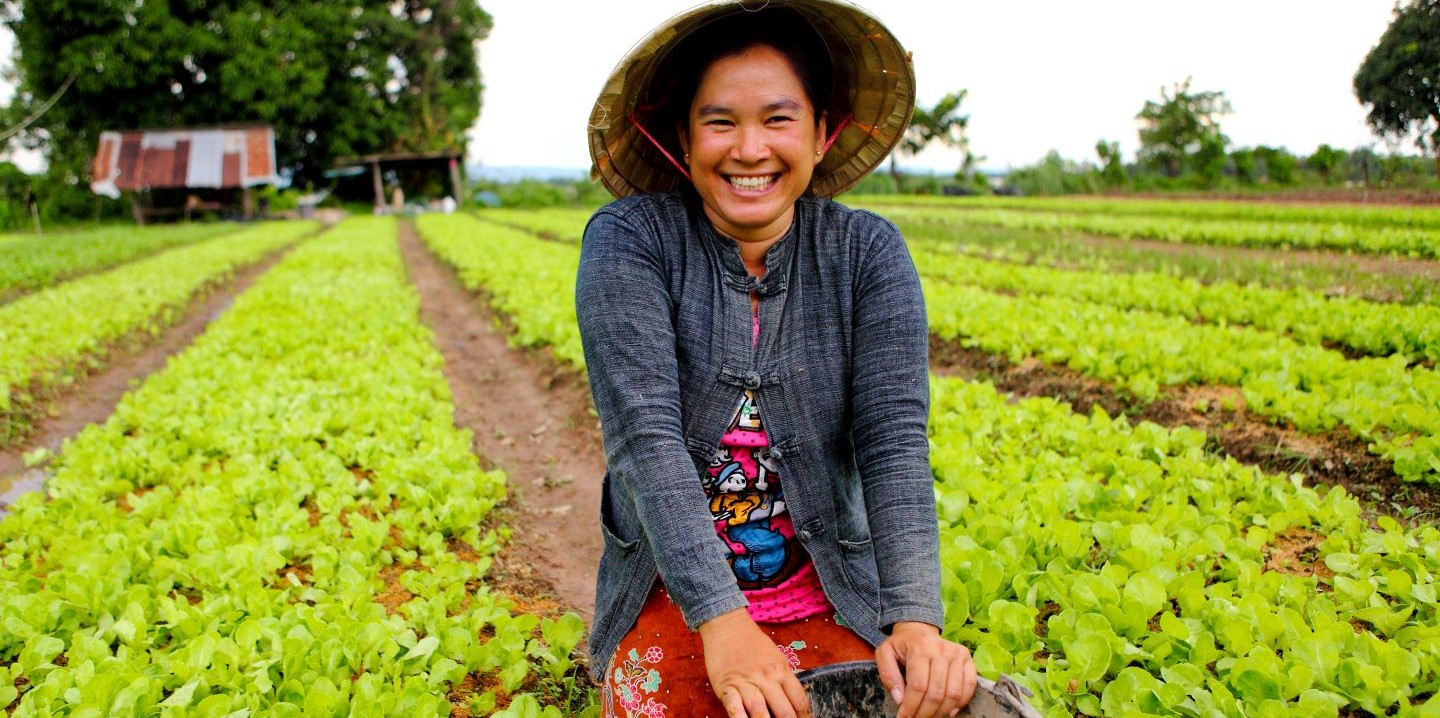Effective micro-organisms: The key to healthy soil and healthy diets in rural Lao
IFAD Asset Request Portlet
Asset Publisher
Effective micro-organisms: The key to healthy soil and healthy diets in rural Lao
Estimated reading time: 4 minutes
Every morning, Mrs Leng wakes early to cook breakfast for her family of nine. After dispatching the four younger children to school, she begins work in her vegetable garden. Once she’s gathered the day’s produce, it’s off to the market to sell it. Finally, she returns in the evening to pick some more vegetables for the evening meal.
Although Mrs Leng comes from a farming family, she hadn’t always worked with vegetables. Her parents had exclusively cultivated upland rice, just like most other families in her village of Taloung-Lalao, in southern Lao’s Salavanh province. After she married, she settled into a similar life: her husband grew upland rice, too, and worked as a labourer in the off-seasons. But, because they were dependent on a single crop for sustenance, her family – just like the others – faced food shortages for 3–4 months of each year.
In 2010, Mrs Leng started a vegetable garden, measuring 60 square metres. She hoped the family could save what they spent on buying fresh produce from the market and be assured of a varied and nutritious diet.
But few vegetables flourished in the hard, red soil. Desperate not to lose the inputs and effort she had already invested, she drained her savings on chemical fertilizers.
At first the chemicals seemed to work. The vegetables flourished. But gradually, she noticed that the soil was getting harder still, water would not drain, and the vegetables developed a strange bitter taste.
Then, in 2015, the IFAD-supported FNML project arrived in Taloung-Lalao, bringing with it a unique approach: effective micro-organisms (EM), specially cultivated bacteria that could condition the soil and manage pests.
Farmers begin by combing the EM mixture (provided by the project) with fixed proportions of sugar, molasses and chopped-up vegetable waste. The mixture is sealed and stored, and the bacteria get to work, turning it into a rich, soupy compost. Once ready, the mixture is diluted and applied to vegetables or other crops. This activates the natural micro-organisms in the soil, conditioning it so other beneficial creatures, such as earthworms, can flourish. It also counts as a nature-based solution: a holistic approach to improving local conditions that promotes the well-being of people and the environment.
Through a combination of trainings on her farm, visits to other sites, and connecting with other farmers, Mrs Leng eagerly learned how to produce EM. With the project’s support, she expanded her garden to 400 square metres, devoting one quarter of it to a greenhouse where she could grow organic vegetables year-round. The project also gave her some seeds and equipment to help her get started.
Since then, Mrs Leng’s garden has flourished.
“The quality of the soil is better,” she says. “There are more earthworms and fewer soil-borne pests. Weed growth has reduced, my vegetables grow faster and the soil has become rich and dark. I see ladybirds in my garden now, and I’ve noticed better drainage. More importantly, now we can keep the produce for a longer time.”
Mrs Leng is now a lead farmer for the programme. With the support of her District Agriculture and Forestry Office, her plot is now an active community learning site. Farmers come, even from other villages, to learn how to replicate her successes.
As Phetsouphanh Keodouangsy, the district coordinator for FNML, says, “If used efficiently, EM can be a farmer’s friend, as it provides more nutrients and yield. This might seem rather a minor benefit to some but here, in remote rural areas, it is everything. It leads to improved nutrition, better incomes and sustainable living conditions for small-scale farmers.”
Indeed, agriculture is the main source of subsistence and livelihoods for Lao rural-dwellers. But these agricultural resources are also highly climate-sensitive, leaving Laos with little capacity to adapt to the changing climate. Solutions like EM are therefore crucial to helping small-scale farmers build resilience and improve nutrition, livelihoods and soil health at the same time.
To date, over 14,000 farming households have benefited from the FNML project. In addition to EM, the project has introduced farmers to many new technologies and techniques to improve their food and cash crops. Between 2014 and 2020, many farmers in the project’s 175 participating villages were able to double their vegetable yields without the use of chemical fertilizers. The per-capita income of participating households doubled, too. Over all, the production volume of 10 of the area’s 12 most common crops rose – during a time when, in non-participating villages, the volume and yield of these same crops increased more slowly or even declined.
Mrs Leng proudly lists what she produces: Chinese cabbage, lettuce, coriander, leek, chili pepper, aubergine, long bean, cucumber and morning glory. Her family eats well, and she has plenty to sell in village and district markets, where the quality and safety of her organic vegetables is well known. She also pickles or preserves some of her surplus. The days when the family spent part of the year short on food are now a distant memory.
“We can smell the freshness in the vegetables now,” she says. “When using chemical fertilizers and pesticides, we could not smell it – quite the opposite. And we can sell our produce all year round at a good price, even in the rainy season.”
Learn more about IFAD’s work in the Lao People’s Democratic Republic.
Publication date: 10 November 2021